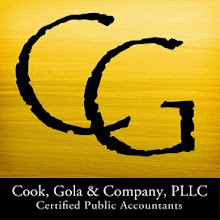I like the quote "Success always comes when preparation meets opportunity". The key to this quote is that the preparation must come before the opportunity. In the wake of the recession, many businesses are not considering preparing for future opportunities. Instead, they are struggling to stay afloat, concentrating on the here and now. Treading water gets you nowhere.
Now is the time to analyze your business. Now is the time to plan and prepare for economic recovery. Robert Half, an accounting and finance staffing company, has some good tips on how to prepare:
1. Keep reassessing budgets. It's important to continually modify budgets to reflect progress or setbacks. Those companies that fully leverage the expertise of financial, budget, treasury or cost analysts will be better positioned to capitalize on improving conditions.
2. Evaluate your bench strength. Have you cut a significant amount of staff? Is it time to do some re-hiring? This can be an ideal time for a "talent upgrade" as many highly skilled financial professionals are in the job market. If you're reluctant to add employees, you can still prepare for the future by engaging temporary professionals to fill potential skills gaps.
3. Revisit compliance requirements. Companies should be prepared to evaluate financial reporting competencies, information technology controls, risk assessment procedures and documentation.
4. Anticipate next-generation financial reporting. The U.S. Securities and Exchange Commission has mandated that public companies report their financials using Extensible Business Reporting Language, or XBRL, an interactive data format, by 2011. In addition, while the timetable for convergence between International Financial Reporting Standards and U.S. GAAP is uncertain, proactive firms are already offering education and training to help staff better understand these initiatives and plan for eventual implementation.
5. Invest in your people. It may be time to consider reinstituting training and development programs. Firms that invest in staff training better prepare their teams for new business opportunities. Professional development also boosts employee job satisfaction.
6. Upgrade IT systems. Outdated financial systems can impair a business's ability to compete, but conversions take time and resources. Companies that are planning systems upgrades should ensure they have the budget and staffing resources to manage the implementation.
7. Prepare for new products and services. For companies that are considering new product or service launches, this is the time to ensure that the new offering can be introduced quickly when the economy rebounds.
8. 'Re-recruit' your best people. Just as your firm may be considering additional hiring, so are other firms. Don't be surprised if top performers are approached with other offers once the economy turns around. A best defense is a good offense: Managers should meet with their best people now to discuss their careers and remind them how much their contributions are valued.
Stop treading water. Now is the time to get prepared so you'll be ready when opportunity strikes.
LeAnn Carlson is the Audit Manager with Cook & Associates, a public accounting firm offering tax, advisory, and audit services to clients from its offices in San Marcos and San Antonio, TX
Subscribe to:
Post Comments (Atom)



Your point #4 is partially accurate. The SEC has mandated XBRL filings for all registrants on a phased schedule. In 2009, the largest companies were required to provide XBRL. In 2010, Accelerated Filers must provide XBRL, with all Non-accelerated filers and 20-F (IFRS) filers being required to provide XBRL in 2011.
ReplyDeleteHow do you plan to audit the XBRL? While there is litigation relief for two years, the risks posed by a new reporting technology probably place significant risk on accountants and filers - so some form of assurance would be prudent. In addition, the SEC is offering the litigation relief only if a company can demonstrate a "good faith effort" to provide error free XBRL.